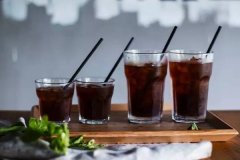Coffee producing areas in Honduras introduce how to brew Honduran coffee.

For professional baristas, please follow the coffee workshop (Wechat official account cafe_style)
Flavor: clean, baked nuts, milk chocolate
In Honduras, coffee-producing areas are divided into six major areas, spread to the west and south, namely Santa Barbara (Santa Barbara), El Paraiso (El Paraiso), Copan (Copan), La Paz (La Paz) and Comayagua (Olan Mound), with an average planting height of more than 1100 meters above sea level. Coffee varieties are Arabica, 69% are HG "High and low Coffee", 12% are SHG "Special Highland Coffee" and 19% are CS. There are mainly Typic, Bourbon, Caturra, Villa Sarch and Lempira.
Bourbon coffee (French: Caf é Bourbon) is a kind of coffee produced by growing coffee trees in bourbon cultivation of Arabica coffee. Bourbon coffee was originally grown in Reunion, which was also known as bourbon Island (. Le Bourbon) before 1789. Later occupied by France to connect with the African continent and Latin America, it is now one of the two most popular producers of Arabica coffee in the world. Bourbon coffee is usually produced between 3500 and 6500 feet above sea level.
Factory name: Qianjie Cafe address: No. 10 Baoqian Street, Yuexiu District, Guangzhou City, manufacturer contact: 020-38364473 ingredients Table: own baking shelf life: 30 net content: 227g packaging: bulk taste: mellow coffee beans ripe degree: coffee cooked beans contain sugar: sugar-free origin: Honduran coffee types: other roasting degree: moderate roasting
Honduras San Juancito Lot#1
Country: Honduras
Producing area: San Juan Theodore
Altitude: 1450-1550 m
Treatment: washing
Hand-washed Honduras. 15g powder, medium grinding (small Fuji ghost tooth cutter 4 grinding), v60 filter cup, 88-89 degrees water temperature, 30g water injection for the first time, steaming for 27 seconds, water injection to 105g water cut off, wait for the amount of water in the powder bed to reach half and then water injection, slow water injection until 225g water, no water powder ratio at the end, 1:15, extraction time 2:00
Because Honduras is located in the tropics, the temperature change in San Juan Theodore is small throughout the year. Therefore, the so-called winter is actually the rainy season, while the so-called summer is actually the dry season. In the tropics, altitude has a greater effect on temperature than the duration of precipitation in a year. San Juan Seto is located more than 1239 meters above sea level, making the temperature slightly cooler all the year round. In summer (March-June), the maximum temperature is usually about 26C, while the average minimum temperature is about 18C. The highest average temperature in winter is 20 ℃ and the lowest is about 14 ℃.
The modern economy of San Juan Seto is largely dependent on agriculture, most of which is small-scale coffee production, and its climate and altitude are very conducive to the production of high-quality coffee beans. COMISAJUL, a partnership of hundreds of small coffee growers in central Honduras, is located in San Juan Theto. COMISAJUL is a cooperative organized by hundreds of coffee farmers in the San Juan Heido region, where coffee is grown in mountains 1450-1550 meters above sea level and shaded by bananas, avocados, papayas and other fruit trees. Coffee farmers pick ripe fruits by hand during the harvest season, wash them and then dry them in the sun. The fermented water with coffee peel and pulp produced by water washing is collected and used as fertilizer for coffee trees. This batch of coffee tastes very clean, high sweetness, very soft acidity, with the flavor of milk chocolate.
Variety: bourbon
Handlers: COMISAJUL Cooperation Organization
San Juan Ciudo is a small village in central Honduras, 40 kilometers northeast of Tegucigalpa, the capital of Honduras. The town is under the jurisdiction of Francisco Morz á n, in addition, the jurisdiction of Francisco Morz á n includes Nuevo Rosario, Guacamaya and Plan Grande, with a total population of about 1400.
Although San Juan Theodore is historically famous for its mineral deposits, it is now highlighted by its location in the buffer zone of La Tigra National Park, a rainforest ecosystem and the first national park in Honduras. The park acts as a huge reservoir, providing domestic water for 500000 residents of the capital.
Important Notice :
前街咖啡 FrontStreet Coffee has moved to new addredd:
FrontStreet Coffee Address: 315,Donghua East Road,GuangZhou
Tel:020 38364473
- Prev

What are the brewing steps of Honduran coffee brands?
Professional baristas Please follow Coffee Workshop (Wechat official account cafe_style) bourbon Coffee (French: Caf Bourbon) is a kind of coffee produced by Arabica coffee bourbon cultivation. Bourbon coffee was originally grown in Reunion, which was also known as le Bourbon Island before 1789. It was later occupied by France to work with the African continent and Latin
- Next

Is Honduran Coffee good? how to make Honduran Coffee
For the exchange of professional baristas, please pay attention to the coffee workshop (Wechat official account cafe_style) varieties: bourbon handlers: COMISAJUL collaboration San Juan Ciudo is a small village in central Honduras located 40 kilometers northeast of Tegucigalpa, the capital of Honduras. The town is under the jurisdiction of Francisco Morazn. In addition, Francisco Morazn includes Nuevo Ros.
Related
- Detailed explanation of Jadeite planting Land in Panamanian Jadeite Manor introduction to the grading system of Jadeite competitive bidding, Red bid, Green bid and Rose Summer
- Story of Coffee planting in Brenka region of Costa Rica Stonehenge Manor anaerobic heavy honey treatment of flavor mouth
- What's on the barrel of Blue Mountain Coffee beans?
- Can American coffee also pull flowers? How to use hot American style to pull out a good-looking pattern?
- Can you make a cold extract with coffee beans? What is the right proportion for cold-extracted coffee formula?
- Indonesian PWN Gold Mandrine Coffee Origin Features Flavor How to Chong? Mandolin coffee is American.
- A brief introduction to the flavor characteristics of Brazilian yellow bourbon coffee beans
- What is the effect of different water quality on the flavor of cold-extracted coffee? What kind of water is best for brewing coffee?
- Why do you think of Rose Summer whenever you mention Panamanian coffee?
- Introduction to the characteristics of authentic blue mountain coffee bean producing areas? What is the CIB Coffee Authority in Jamaica?

